International Law and Immigration
ILS News – September 2025
Message from the Chair
Message from the Chair

This is my last message as Chair. It has been an honor to serve with such talented ILS Members and Advisors. I am pleased to announce our incoming officers. The Chair is Brian Arbetter, Vice-Chair is Radhika Balaji, Treasurer is Melissa Allain, Secretary is Neeraj Bhatia, and our Board Representative is Harumi Hata. We also added two distinguished colleagues as ExCom members: Josh Surowitz and Patrick Byrne. Congratulations to all of you. I know you will continue our tradition of excellence.
September was a busy month as we welcomed four international delegations to Los Angeles to join us for activities related to the ILS ExCom and the CLA Annual Meeting. Our first event was a Dodger Game on Wednesday night where international guests and ILS section members enjoyed a baseball game together. And there was a serendipitous bonus for all who attended – it was Ohtani Bobblehead night – everyone went home with a Shohei Ohtani bobblehead!
We are grateful to the Buchalter Law Firm who generously hosted the ILS ExCom meeting where attorneys from the Osaka Bar Association, Kanagawa Bar Association, Daiichi Tokyo Bar Association and Vietnam Lawyers Association met and discussed future opportunities to collaborate. We then visited the United State District Court to observe a closing argument in a criminal trial and then had an engaging conversation led by Honorable Judge George H. Wu.
After a catered networking lunch at Buchalter, we traveled to the CLA Joint Sections Award Reception at the Sheraton Universal Hotel where Jeff Daar presented the Warren M. Christopher International Lawyer of the Year Award. Our recipient this year is the impressive Honorable Judge M. Margaret McKeown. She was recognized for the promotion of the rule of law internationally and for her significant achievement in the practice of international law.
After the ceremony we joined our guests of honor at Buca di Beppo. I want to recognize and thank again our dinner sponsors who include Allain Law, Buchalter APC, The Burton Law Firm, PC, Global Capital Law Group, Law Office of Kevin Levine, Inc. and Surowitz Immigration, PC. In addition, the dinner guests are grateful to Jeb Burtan who donated his sommelier expertise and selected wines from his personal collection which we all enjoyed.
It is not a surprise that our trip to Milan, Italy, sold out before the early bird deadline. The conference is perfectly timed in October for participants to experience mild and pleasant weather as they earn MCLE, expand their professional network, see timeless art and fashion, experience traditional Milanese food, enjoy world-renowned wines and gaze upon Lake Como on Saturday from Hotel Bellagio where lunch will be served and followed by free time to explore the region.
If you have not yet joined our section, what are you waiting for? This is your invitation to do so. There is something for everyone and all are welcome.
Theresa Leets
Chair, International Law and Immigration Section
California Lawyers Association
Events
FREE International Movie Night
October 24, 2025 | 5:00PM – 8:00 PM | Loyola Law School
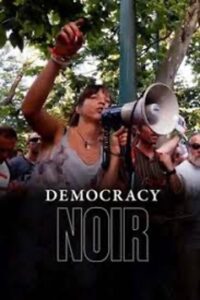
Political documentary filmmaker Connie Field’s newest, “Democracy Noir,” is a Hungarian tale that chronicles the rise and power of Hungary’s Prime Minister, Viktor Orbán, and his efforts to undermine democracy, the film follows three women— (1) MP Tímea Szabó, (2) journalist Babett Oroszi, and (3) nurse and activist Niko Antal—as they work to preserve their nation’s rights.
Past Conferences
CLA Annual Meeting | ILS ExCom Meeting
September 12, 2025 | Los Angeles, CA
Daiichi Tokyo Bar Association
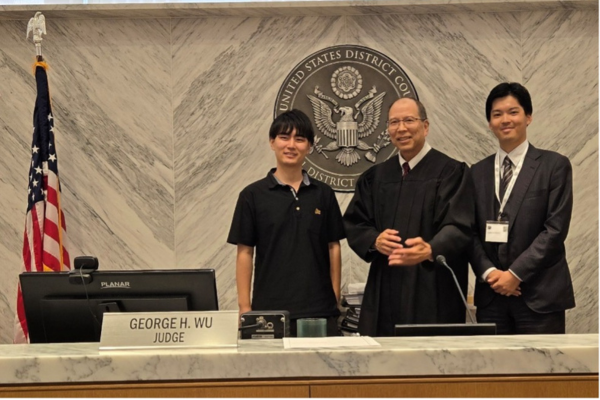
Kanagawa Bar Association
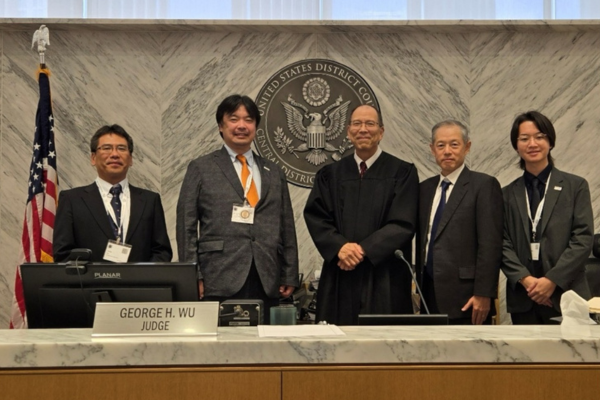
Osaka Bar Association
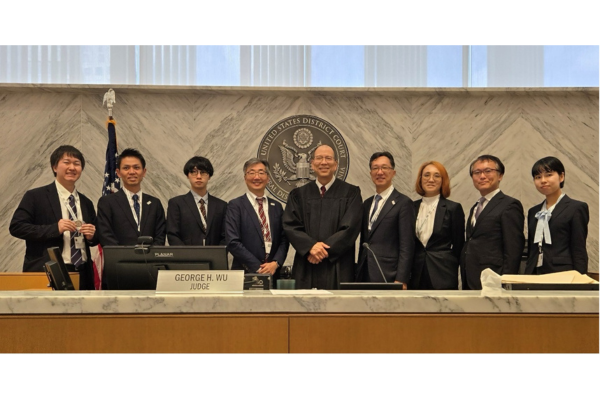
Vietnam Lawyers Association
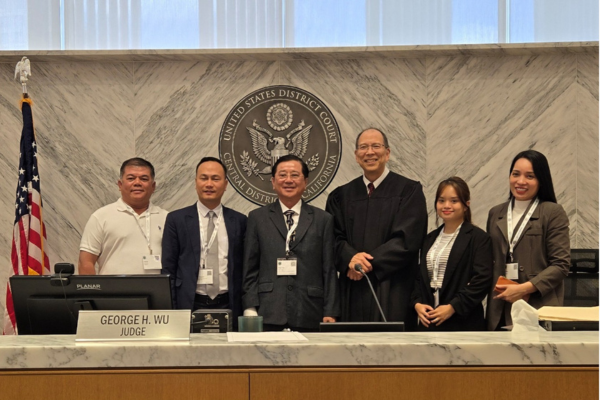
Group photo
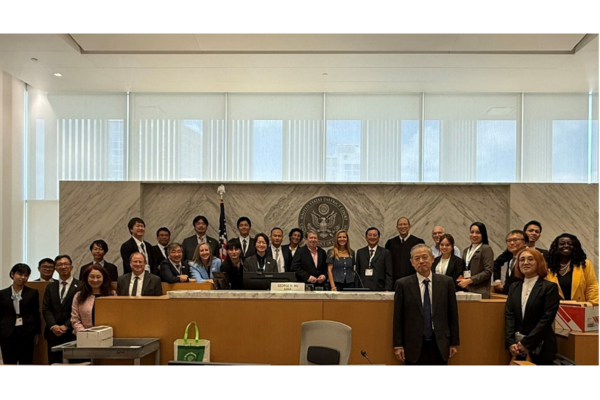
United States District Court Visit with Honorable George H. Wu
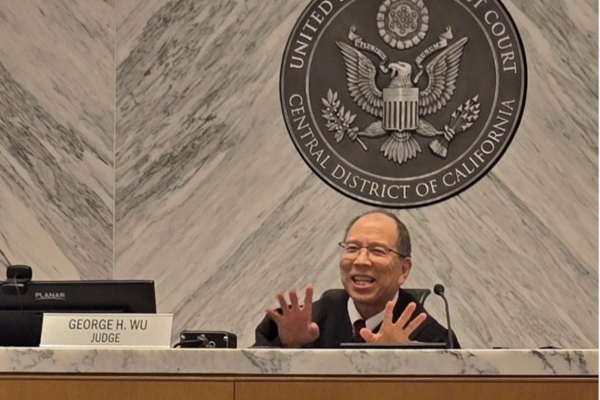
CLA Joint Sections Award Reception | ILS Warren M. Christopher
International lawyer of the Year Award
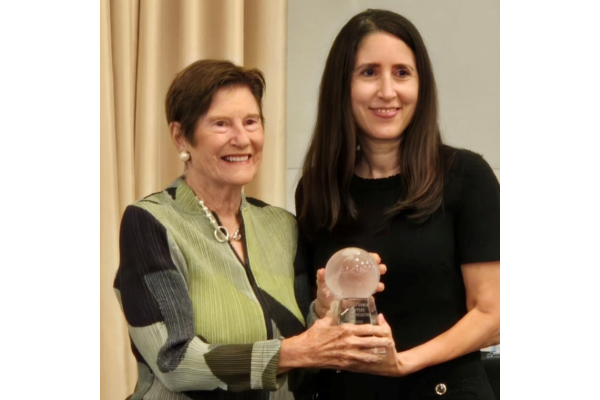
Guerrero presents Judge M. Margaret McKeown
ILS’s 2025 International Lawyer of the Year Award

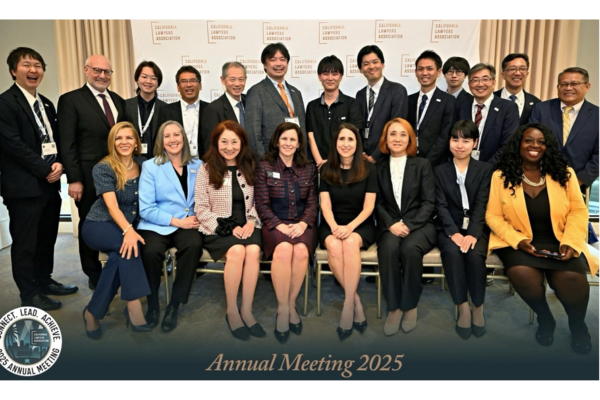
Front L-R: Ana Sambold, ILS Chair Theresa Leets, Harumi Hata, CLA President Betty Williams, California Supreme Court Chief Justice Patricia Guerrero, Masami Oishi, Eri Segawa, Margaret Francisco.
ILS ExCom Dinner at Buca di Beppo
Universal City Walk



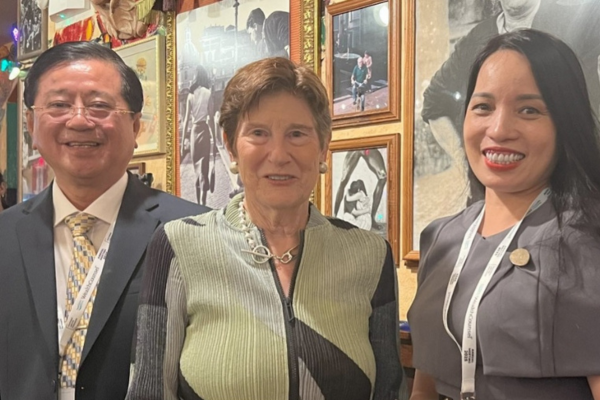
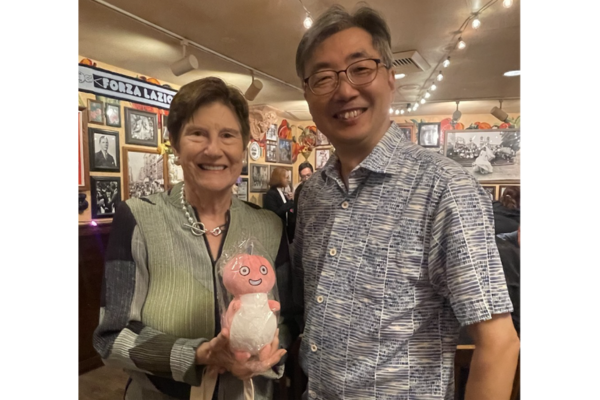
the Osaka Bar Association’s official legal dragon mascot, Ryu

CLA Sneaker Ball



International Conferences
October in Milan
October 15 – 18 in Milan, Italy
This event is sold out.

Join us for an unforgettable experience in Milan!
- Earn MCLE credits while participating in a series of thought-proviking academic sessions and networking opportunities.
- Indulge in exquisite Italian cuisine and world-renowned wines.
- Explore Milan’s iconic museums, art galleries, and historic landmarks, including Lake Como.

Past Events
FREE International Movie Night
September 7, 2025 | 2:00 – 5:00 pm | Los Angeles
The Los Angeles County Bar Association’s International Law Section and the California Lawyers Association’s International Law and Immigration Section, in collaboration with the Democracy Center, sponsored a free International Movie Night, featuring an award-winning film Invisible Nation. Over 100 people watched attended this special screening of Invisible Nation, exploring Taiwan’s emergence as a beacon of democracy amidst challenges of international recognition and geopolitical risks. The film features government officials, activists, and Taiwan’s first female president, Tsai Ing-Wen. The screening was followed by a Q&A with director Vanessa Hope and composer Wei-San Hsu.
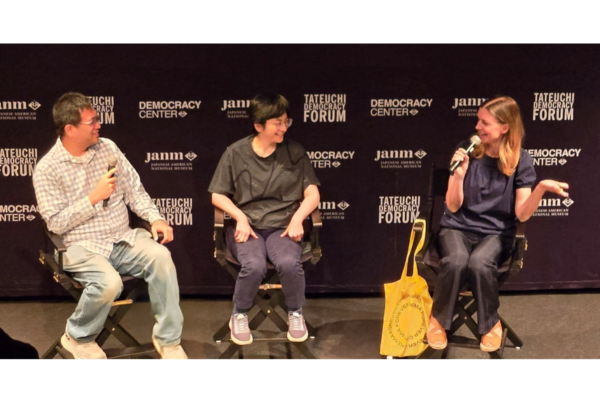
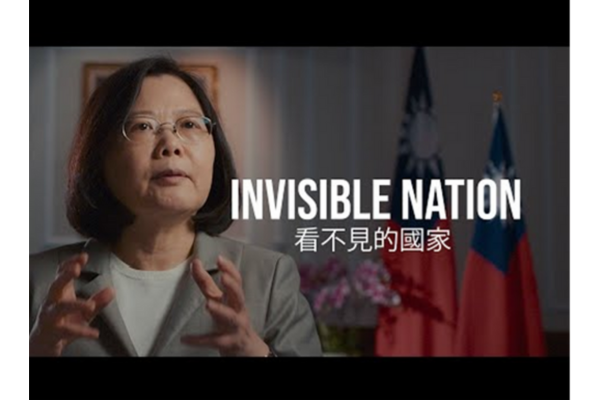
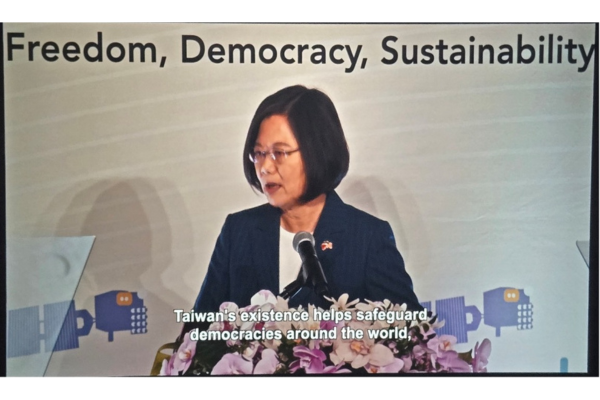
Los Angels Dodgers vs. Colorado Rockies
September 10, 2025 | 7:10 PM | Dodger Stadium, Los Angeles, CA







Around the World
ILS ExCom advisor, Ric Bainter, shares photos of a Soviet T-54 tank captured while on a hike in Bosnia and from a boat as he passes through the inside Passage in western Canada.


Article
Update and Examination of Executive Order 14203 Sanctions on Persons Who Aid the International Criminal Court
By T. Sean Butler
On February 6, 2025, President Trump signed Executive Order (EO) 14203, imposing sanctions on personnel of the International Court of Crimes. EO 14203 closely tracks EO 13928 issued on June 1, 2020 from the prior Trump administration (2016 – 2020). The 2020 sanctions order was later terminated by the Biden administration on the latter’s issuance of EO 14022. EO 13928 was also subject to a permanent injunction by a federal district court, which was not appealed.
Two federal US courts recently enjoined enforcement of this year’s EO 14203, in each case limiting judicial relief to the parties before the court. Below is a brief summary of the rulings, followed by an examination of the underlying assumptions, justifications, sovereignty and other issues facing the Administration under the International Emergency Economic Powers Act.
Recent Judicial Decisions
On July 18, 2025, Judge Nancy Torresen of the US District Court for the District of Maine issued a preliminary injunction related to enforcement of Executive Order (EO) 14203, which imposed sanctions on attorneys related to their cooperation with personnel of the ICC. As previously reported in the August edition of the ILS newsletter, the decision was based in part on finding that plaintiffs showed a likelihood to prevail on the claim that the EO violated their First Amendment rights to free speech. Smith, et al. v. Trump, Case 1:25-cv-00158-NT.
On August 18, 2025, Judge Jesse Furman of the US District Court for the Southern District of New York issued a permanent injunction enjoining enforcement of sanctions with respect to two professors working in different ways to support ICC investigations. Rona v. Trump, et al., 25-cv-03114-JMF-Rona-v.-Trump-Op.pdf
Judge Furman explained the implications of EO 14203 and the underlying reliance on the International Emergency Economic Powers Act (IEEPA), 15 USC 1701 et seq.
“Because the 2020 Order was issued pursuant to IEEPA, any person who violated the Order was potentially subject to IEEPA’s civil and criminal penalties. IEEPA grants the President certain powers upon his declaration of a national emergency under the National Emergency Act, 50 U.S.C. §§ 1601 et seq., with respect to “any unusual and extraordinary threat, which has its source in whole or substantial part outside the United States, to the national security, foreign policy, or economy of 3 Case 1:25-cv-03114-JMF Document 70 Filed 07/30/25 Page 4 of 23 the United States.” 50 U.S.C. § 1701(a). When the President declares such an emergency, the President may “block . . . , regulate, . . . void, prevent or prohibit, any acquisition, holding, withholding, use, transfer, withdrawal, . . . dealing in, or exercising any right, power, or privilege with respect to, or transactions involving, any property in which any foreign country or a national thereof has any interest by any person, or with respect to any property, subject to the jurisdiction of the United States.” Id. § 1702(a)(1)(B).
“Persons designated under IEEPA are placed on the Specially Designated Nationals and Blocked Persons List (“SDN List”), which is maintained by the Office of Foreign Assets Control (“OFAC”). … Anyone who interacts with a designated person in a prohibited manner is subject to penalties under IEEPA, which today include civil fines in an amount equal to the greater of $377,700 or twice the value of a violative transaction, and criminal penalties in the form of a fine of up to $1,000,000 and (for a natural person) up to twenty years’ imprisonment. 50 U.S.C. § 1705; see 90 F.R. 3687-01 (2025).”
Enforcement Action Based on Executive Order 14203
On September 4, 2025, US Secretary of State Marco Rubio announced sanctions against three foreign non-governmental organizations (NGOs) pursuant to Executive Order 14203, l Haq, Al Mezan Center for Human Rights, and the Palestinian Centre for Human Rights. According to the announcement, the three NGOs “have directly engaged in efforts by the International Criminal Court (ICC) to investigate, arrest, detain, or prosecute Israeli nationals, without Israel’s consent.”
Analysis of Executive Order 14203
The foregoing decisions and enforcement action illustrate both the sweeping breadth and the vulnerability of EO 14203 to judicial limitations and invalidation of sanctions as beyond the scope of the President’s authority under the International Emergency Economic Powers Act, and in violation of the First Amendment and other constitutional rights of individuals who interact with designated individuals subject to sanctions under the IIEPA.
EO 14203 is subject to further challenge from a policy perspective because it attacks the independence of jurists, prosecutors and investigators for properly doing their jobs. In one particular case, the jurists and prosecutors perform important services for an international court rather than a domestic court, but it is still an attack on the just rule of law to attack those civil servants.
EO 14203 states that its authority is based on the International Emergency Economic Powers Act (IEEPA), 15 USC 1701 et seq., and that “(ICC) … engaged in illegitimate and baseless actions targeting America and our close ally Israel …. [ICC] asserted jurisdiction over and opened preliminary investigations concerning personnel of the United States and … Israel … issuing baseless arrest warrants targeting Israeli Prime Minister Benjamin Netanyahu and Former Minister of Defense Yoav Gallant. The ICC has no jurisdiction over the United States or Israel …. This malign conduct in turn threatens to infringe upon the sovereignty of the United States and undermines the critical national security and foreign policy work of the United States Government and our allies, including Israel ….”
EO 14203 provides for individuals of the ICC to be named and included on the Specially Designated Nationals and Blocked Persons List (“SDN List”) maintained by the Office of Foreign Assets Control (“OFAC”). Those who violate the sanctions by interacting in prohibited ways, including others who provide services to the named individuals, are subject to civil penalties of not less than $377,700 as well as criminal penalties in the form of a fine of up to $1,000,000 and for individuals, up to 20 years in prison.
Only ICC Prosecutor Kharim Khan was identified as an individual to be added to the sanctions list when the EO was issued in February 2025. On June 5, the US State Department added four other ICC judges from Uganda, Peru, Benin, and Slovenia. On August 20, 2025, the US State Department announced four more ICC judges to be added to the list: Judge Kimberly Prost of Canada, Judge Nicolas Guillou of France, Deputy Prosecutor Nazhat Shameem Khan of Fiji and Deputy Prosecutor Mame Mandiaye Niang of Senegal.
EO 14203 is based on erroneous, unfounded or false assumptions that the ICC does not properly have jurisdiction over crimes committed on the territory of state parties and that investigations by the ICC are an attack on state sovereignty.
The ICC only investigates and tries individuals, not nations. Many mistakenly claim that the ICC is improperly targeting the United States or Israel. The ICC does not target or try nations. Only individuals are brought before the ICC. The ICC has limited subject matter jurisdiction. It is not part of the United Nations although it does have a working relationship with the United Nations and accepts UN Security Council referrals.
The first mistaken assumption in EO 14203 is that the ICC improperly asserts jurisdiction if warrants are issued for individuals accused of alleged atrocity crimes committed on the territory of the state party to the Rome Treaty. The place where a crime is allegedly committed is the most common basis for assertion of criminal jurisdiction. If someone robs a bank, the court with jurisdiction over that territory typically has jurisdiction to try the individuals accused of that crime. With limited exceptions, for example, diplomatic immunity or status of forces agreements, the nation where the crime was committed has jurisdiction regardless of the nationality of the individual(s) accused.
Pursuant to the Rome Treaty, the states party to the treaty agreed that cases involving crimes on their territory may proceed before the ICC, if other courts, including those of the subject nation, are either unable or not genuinely willing to investigate or prosecute.
There is no violation of international law for a nation to agree to have cases which that nation could have tried because the crimes occurred on that nation’s territory, instead tried by an international tribunal, if there is no other court that is able or genuinely willing to investigate and if warranted prosecute.
This is especially true when so many nations (125) are parties to the same treaty and all have made that same agreement with respect to alleged crimes committed on their territory.
The assumption that the ICC improperly asserts jurisdiction over nationals of non-state parties if the alleged crime is committed on the territory of a state party is false and should not form a proper basis for any executive orders.
A second mistaken assumption is that investigations or prosecutions of nationals of non-state parties when the acts are committed on the territory of a state party constitute an attack on national sovereignty. That assumption ignores that the jurisdiction of the ICC is complementary to national courts and so there is no violation of national sovereignty. A case is inadmissible before the ICC if the national courts of that individual state party are able and genuinely willing to investigate and, if warranted, to prosecute the alleged crimes. The limitation is only if the national courts are used as a sham to shield individuals from responsibility.
There is no violation of national sovereignty because the ICC promotes national prosecutions and does not usurp them. It is only if national courts are not able or not genuinely willing to act that the ICC will step in as a backup for the national courts at issue. The assumption that ICC investigations violate national sovereignty is false.
One of the reasons the Rome Treaty did not limit initiation of cases to those referred by the United Nations Security Council (UNSC), the position advocated by the US, is that cases are not subject to the politics of the Security Council. UNSC can place cases on hold if it is in the interests of justice for such a deferral (e.g., a case where a peace negotiation might stall if the ICC proceedings were not deferred). The treaty provides for one-year deferrals that may be extended indefinitely.
The Trump administration EO reflects inconsistent policy by the US. The US supported efforts by the ICC related to the invasion of Ukraine by Russia. (Like the US, Russia is not a party to the Rome Treaty. In 1999 the US signed the Rome Treaty but later withdrew its signature.) The US has abstained on UNSC referrals to the ICC for the situations in Darfur and in Libya, allowing those cases to proceed.
Now, the US is sanctioning personnel of the ICC and other individuals for participating in investigations of alleged atrocity crimes committed on the territory of a state party, if those being investigated are US nationals or nationals of allies who have not consented to the jurisdiction of the ICC.
US support of ICC investigations of the conduct of Russian individuals for crimes allegedly committed in Ukraine is inconsistent with the US sanctioning ICC personnel for investigations of individuals alleged to have committed crimes in the territory of Afghanistan (a state party to the Rome Treaty) and in the territory of Palestine (determined by the UN to be state and now a state party to the Rome Treaty).
The sanctions also are making US allies less willing to work with the US. All but one of our NATO allies are state parties to the ICC. Most of the nations that make up the European Union are state parties. Individuals on the sanctions list include Canadian, French and Slovenian jurists. Imposing sanctions on individuals who are nationals of US allies risks those allies asserting countermeasures to avoid the sanctions, their lack of cooperation in other matters, and resentment that could impose adverse impacts on the US.
In conclusion, US courts have questioned the legality of EO 14203 and the Trump Administration’s assumptions and reliance on its interpretation of the IIEPA to impose sanctions, all likely subject to further judicial scrutiny.
Editor’s Disclaimer: The opinions expressed are solely those of the author and neither endorsed nor adopted by the California Lawyers Association, its officers, directors, employees, or members, the International Law and Immigration Section or any other part of the Association.

T. Sean Butler has over 40 years of experience practicing law. His area of practice includes business litigation, international business transactions, bankruptcy, criminal law and appellate work. He has a specialized interest in justice and the rule of law in developing nations and finding peace from war or other conflicts through international law.
